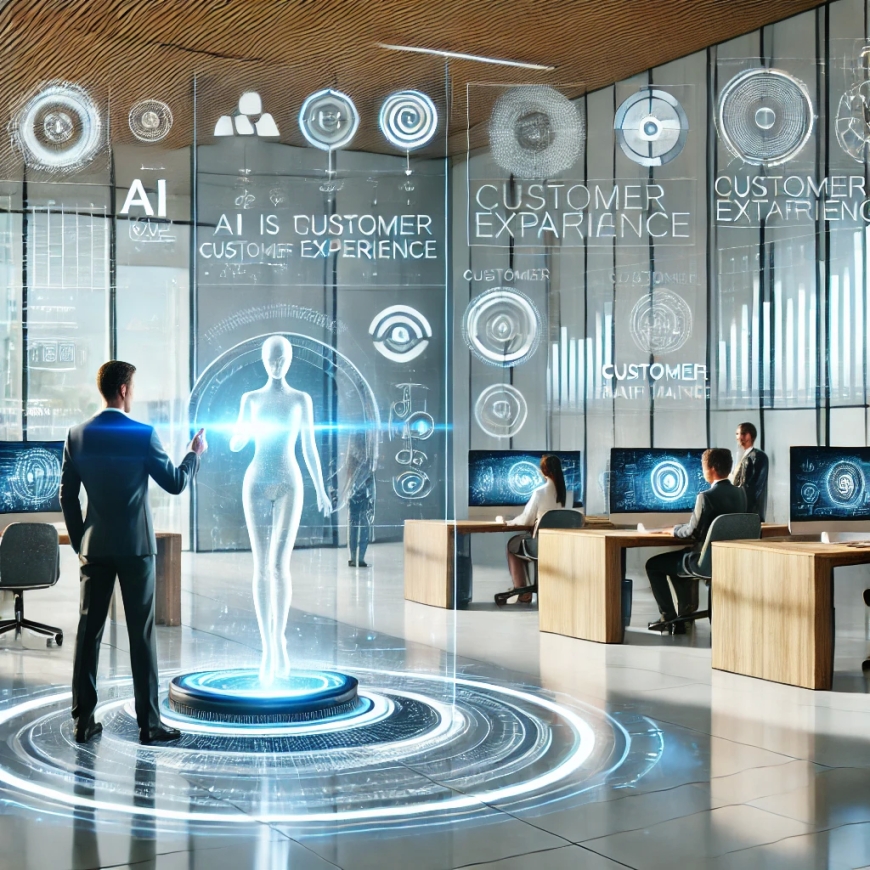How AI Is Changing Employee and Customer Experiences in 2025
AI is transforming employee and customer experiences in 2025, offering personalization, efficiency, and insights.

In 2025, artificial intelligence (AI) is not just a tool for businesses; it is becoming a crucial part of how companies shape both employee and customer experiences. AI’s ability to automate processes, analyze large amounts of data, and provide insights has already begun to transform business operations in unprecedented ways.
By helping businesses streamline workflows and deliver more personalized interactions, AI is reshaping the landscape for employees and customers alike.
In this blog post, we will explore how AI is influencing these experiences and how businesses can benefit from these changes.
AI and Employee Experience
As we move into 2025, employees will find that AI is increasingly playing a role in improving their work experience. Many businesses are already using AI to streamline administrative tasks, automate routine processes, and make data-driven decisions. This leads to a more efficient work environment, freeing up employees to focus on more meaningful and creative work.
AI tools can handle time-consuming tasks such as scheduling meetings, organizing emails, and managing calendars, all of which can be done faster and more accurately by AI. This gives employees more time to focus on tasks that require problem-solving and decision-making. For instance, AI chatbots can handle basic inquiries from customers or other employees, allowing staff to devote their attention to more complex or higher-value tasks. As a result, employees can enjoy a more fulfilling and productive workday.
Moreover, AI is helping employees stay connected with their teams in ways that were not possible before. Virtual assistants can help coordinate group efforts, schedule meetings, and even suggest the best times for collaborations. AI-powered communication tools can break down barriers, making it easier for employees to work together regardless of their physical location. With remote work becoming increasingly common, these tools are essential for maintaining strong team cohesion and collaboration.
AI in Customer Experience
When it comes to customers, AI is already making a significant impact. Businesses are using AI to personalize customer interactions, making them more engaging and relevant. In 2025, these AI-driven experiences will become even more sophisticated, leading to a stronger bond between brands and their customers.
For example, AI-powered recommendation engines are already being used by e-commerce companies to suggest products based on a customer’s previous shopping history. By 2025, AI will be able to predict a customer’s needs more accurately, offering them not only products they’re likely to purchase but also services and solutions they may need in the future. This predictive capability will make the customer experience more seamless and frictionless, reducing the effort required for customers to find what they want.
Similarly, businesses will use AI to personalize communications, sending targeted emails, notifications, and messages tailored to each customer. AI can analyze customer data to understand their preferences, behavior, and interests, allowing businesses to send timely and relevant information. This targeted approach improves customer engagement and makes customers feel valued, increasing their loyalty to the brand.
In addition to personalization, AI is transforming customer service. Chatbots and virtual assistants are becoming more advanced, capable of handling a wide range of customer queries. These tools provide instant support, offering solutions to common issues without requiring a human agent. AI-driven chatbots will be able to provide 24/7 assistance, ensuring that customers’ needs are met at any time of the day or night.
Even though many people still prefer speaking with human agents, AI’s ability to handle routine queries means that human agents can focus on more complex issues that require empathy and critical thinking. This leads to faster response times and a better overall customer experience. Furthermore, AI systems can learn from customer interactions, improving over time to provide more accurate and helpful responses.
AI and Employee Empowerment
AI isn’t just about replacing tasks—it’s also about empowering employees. By automating mundane tasks, employees can focus on more important aspects of their roles, such as decision-making, strategy, and creative problem-solving. AI can provide employees with real-time data and insights that help them make more informed decisions.
For instance, in marketing departments, AI can analyze large datasets to uncover trends and patterns that might be difficult for humans to spot. With this information, employees can adjust their campaigns and strategies to better align with customer needs. This not only boosts productivity but also gives employees the tools they need to innovate and add more value to the business.
In the same way, AI is helping employees with personal development. AI-powered learning platforms are becoming more common, offering personalized training and development programs based on an employee’s skills, preferences, and goals. These platforms adapt to each individual’s learning pace, providing a more tailored and effective educational experience. As a result, employees can improve their skills and grow professionally, benefiting both themselves and their employers.
AI in Decision Making
AI’s ability to analyze data and provide actionable insights is revolutionizing how businesses make decisions. In 2025, AI will play an even more prominent role in decision-making processes. By analyzing vast amounts of customer data, sales patterns, and market trends, AI can help businesses predict future trends and adjust their strategies accordingly.
This predictive capability is particularly valuable in sectors such as retail, where understanding consumer behavior is crucial. AI can help businesses understand which products will be in demand, when customers are likely to make purchases, and what factors influence their buying decisions. This information can be used to optimize inventory, improve marketing campaigns, and adjust pricing strategies.
However, despite AI’s growing presence in decision-making, human judgment will still be necessary. AI can provide valuable data and insights, but it cannot replicate human intuition and experience. As a result, the most successful businesses in 2025 will be those that combine AI-driven insights with human decision-making. By doing so, they can make more informed and effective decisions that benefit both employees and customers.
Innovations in AI
As AI continues to evolve, some applications of AI are generating controversy, particularly in areas like content creation. One such example is the development of AI-driven platforms like the AI porn generator. These tools raise important ethical concerns about privacy, consent, and the regulation of adult content. While these technologies remain niche, they highlight the broader potential of AI to create content across various industries, including entertainment, education, and marketing.
In a more mainstream context, AI-driven content creation tools are revolutionizing how businesses produce marketing materials, blogs, and social media posts. With all AI tools in one website, businesses can access a variety of AI-powered platforms for tasks ranging from content creation to data analysis. This centralization makes it easier for businesses to create high-quality content that resonates with their target audience and drives engagement.
By 2025, these AI-powered content creation tools will be even more advanced, capable of producing content that closely resembles human-written materials. Not only can these tools generate written content, but they can also produce videos, images, and even voiceovers. This will be especially useful for small businesses that may not have the resources to hire professional content creators.
The Future of AI: What Lies Ahead?
Looking ahead, the role of AI in shaping both employee and customer experiences will only continue to grow. By 2025, AI will be a central part of business operations, helping companies deliver more personalized, efficient, and seamless experiences. Employees will benefit from AI’s ability to automate routine tasks and provide insights, while customers will enjoy a more tailored and responsive service.
At the same time, businesses will need to navigate the ethical challenges that come with the rise of AI. Issues such as data privacy, AI bias, and the regulation of AI-generated content will require careful consideration. However, with the right approach, AI can be a powerful tool for improving both employee and customer experiences.
In conclusion, AI is set to revolutionize the way businesses operate in 2025. From improving employee productivity to enhancing customer engagement, AI is changing the way we work and interact with brands. As we move into the future, businesses that adopt AI technologies will be better positioned to thrive in an increasingly digital world.
What's Your Reaction?





















